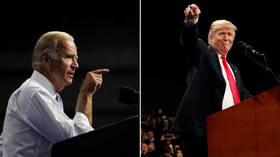Hello ‘Chinagate’: Why blaming Beijing is all the rage this US election cycle

Forget the Covid-19 pandemic, both US President Donald Trump and his Democrat challenger Joe Biden intend to use China as a weapon to bash each other in the 2020 presidential race, promising a new Cold War no matter who wins.
Trump’s China-bashing is not exactly new. He has called out Beijing for years over “unfair” business practices and drove a hard bargain in the trade talks that were successfully concluded on the eve of the pandemic.
Since then, the US president has also waved off China’s official figures about the coronavirus contagion and death toll, and all but accused Beijing of cooking up the virus in a Wuhan laboratory.
Also on rt.com Trump says US conducting ‘very thorough’ probe into Covid-19 origins, refuses to dismiss ‘sources’ pushing Chinese lab narrativeHis 2020 re-election campaign has decided to leverage it against Biden as well, lining up attack ads portraying Biden as “soft on” and “too cozy with” China, even bringing up his son Hunter’s service on boards of Chinese companies – just as he did in Ukraine. They also called out Biden for opposing Trump’s ban on travel from China in the early days of the pandemic.
“When the president wants to implicate China in the outbreak of the coronavirus, which is an obvious fact, Joe Biden says such concerns shouldn’t be talked about and are xenophobic,” his campaign’s communications director Tim Murtaugh told Hill TV’s Rising on Thursday.
.@JoeBiden has a China problem:❗️Doesn’t view China as economic competitor❗️Opposed describing China as source of virus❗️ Opposed Trump China travel restrictions (until he didn’t)❗️Son Hunter used his name to score Chinese cash while he was VPSleepy Joe is soft on China
— Brad Parscale - Text TRUMP to 88022 (@parscale) April 17, 2020
Democrats have previously sought to tie Trump to Russia, which may have failed to stop his election but managed to snarl up most of his first term in investigations he called a “witch hunt.” The final gasp of this approach was the accusation Trump abused his office by pressuring Ukraine to investigate Hunter Biden – which got him impeached in the House on the eve of the pandemic, but acquitted in the Senate.
Now, the party is planning to argue that Trump “rolled over” for China and took too long to react to the pandemic because he prioritized making a trade deal, according to a memo made public by Axios this week.
Calling Trump weak on China is an “understatement,” the DNC war room wrote, adding that the president “put himself and his political fortunes first.”
NEW: In the coming weeks and months, Democrats plan to argue Trump "rolled over" for China as the coronavirus crisis worsened because "he sought a deal to begin undoing the damage caused by his trade policies," per a new memo reviewed by Axios.https://t.co/NBBv15V4k7
— Axios (@axios) April 16, 2020
While that’s truly a bold strategy, as the meme goes, the fact that both parties think nothing of risking a confrontation with a major world power merely as a way to win power at home is… disturbing.
This is hardly the first time, of course; red-baiting was all the rage during the Cold War, for instance. Back in 2012, Obama answered then-Republican presidential nominee Mitt Romney’s rants about Russia by taunting him that the 1980s were “calling to ask for their foreign policy back.”
Within just a couple years, the Democrats did an about-face and hitched themselves to the ‘Russiagate’ conspiracy wagon. It appears the role of scapegoat to the concerns of US domestic politics has now been assigned to China by bipartisan consensus.
Democrats unleash their strategy of attacking Trump as too pro China. So we have both parties competing over who can be more anti China and push us closer to Cold War 3.0. Reminds me of how both parties would compete over who could be more hawkish against the big bad Muslims. https://t.co/MLQ0ORUzcr
— Rania Khalek (@RaniaKhalek) April 17, 2020
While this may play well to the domestic audience, eager to blame someone for the pandemic that has so far claimed 35,000 American lives and over 22 million jobs – neither party seems to take into account what China might do in response.
Lest one think that shouldn’t matter, China has a lot of agency here. Unlike Russia, it is deeply embedded in the US economy after decades of globalization. All too many US-based corporations have outsourced their entire supply chains overseas, as the pandemic so painfully illustrated. Beijing also holds massive amounts of US debt, and its authorities have had enough leverage over Hollywood movie studios or the NBA to compel compliance in “culturally sensitive” matters, to name but two other examples.
China’s rulers are also far pricklier about national honor than Russia. So while Moscow laughed off the ‘Russiagate’ scandal-mongering as childish nonsense, there is no indication Beijing would be quite so magnanimous.
The statements, views and opinions expressed in this column are solely those of the author and do not necessarily represent those of RT.














